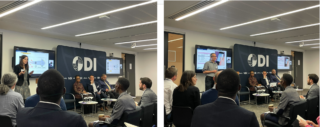
The event celebrated the launch of ODI and Public Digital’s new Digital Public Finance Hub. Image: ODI
Building on our engagement with ODI, last week on Tuesday March 21st, Public Digital held an event to launch our new Digital Public Finance Hub.
The event, entitled ‘Budgets and Bytes: How can digital improve public spending?’ examined the intersection of digital and public finance. In particular, it looked at the increasing relevance of digital service delivery approaches for public financial management (PFM), as well as the implications of such approaches for digital government transformation more broadly.
Making public finance digital
Public financial management (PFM) is a process-driven and highly professionalised discipline, with many strong practices and institutionalised ways of working. While the institutionalisation of PFM practices and professionalisation of PFM in government speaks to a proliferation of good thinking and learning around public finance, it has also created a certain rigidity in the practice of PFM that has made it resistant to change.
Broadly, the problem has been that good practices and the digital solutions that underpin them have often been adopted by PFM practitioners for their own sake – seen as ends in and of themselves, rather than a means to an end. As a result, there has been a significant trend of technological solutionism and ‘hammers looking for nails’, rather than problem-driven, iterative adaptation of PFM approaches and processes supported by digital tools.
Last Tuesday’s event aimed to use digital as a way to begin changing the conversation around what is possible in PFM, with an eye towards modernisation. Building on our two new working papers on the emerging paradigm for digital PFM and the challenges to making public finance digital, (launched on Monday, March 20th), the event sought to highlight how PFM as a discipline requires digital tools and digital-era ways of working in order to address contemporary challenges.
The flow of the day
The event was split into four sessions, each of which was placed in the day to reflect a natural progression from the prevailing to emerging paradigm for digital PFM. We were delighted to see such a strong presence at the event – including 25 speakers and over 160 attendees, representing over 20 different countries – and we noticed a heartening consensus around the relevance of the topics discussed.
The day started with an overview from the authors of our first paper which highlighted three approaches needed to make public finance digital and trigger a paradigm shift towards digital public financial management. These three approaches are: a new approach to PFM reform and digital transformation; a new approach to technology; and, a new approach to funding and delivery.

The event began with an introduction to the event and the framing concepts behind our newly-released papers, including presentations from Public Digital Partners Emily Middleton (left) and James Stewart (right).
This overview also included an introduction from Cathal Long, a Research Fellow at ODI overseeing the work on digital and public finance, followed by a consideration of the broader view on PFM reform and digital transformation, presented by Marco Cangiano of ODI. Emily Middleton and James Stewart from Public Digital discussed emerging considerations from the paper around approaches to technology and funding/delivery.
In Session 1, we heard about the view from inside finance ministries. Participants such as Yakama Jones from Sierra Leone’s Ministry of Finance and Hennie Swanepoel from South Africa’s treasury highlighted how countries are struggling to find the right mix of technologies and systems to meet their needs. The session also reflected on the dominance of financial management information systems (FMIS), as well as the fact that these systems are used to plug holes, not necessarily to solve problems.
In Session 2, we heard the view from beyond finance ministries, with perspectives from those working closely with governments on digital service delivery challenges rooted in PFM issues. We heard from participants like Prashanth Chandramouleeswaran of the eGov Foundation, Gemini Mtei of USAID / Abt Associates, and Sheila Kigozi of ODI about how challenges rooted in the digitalisation (or lack thereof) of PFM systems lead to challenges in service delivery in sectors as varied as water, health, and education.
Building on this broader framing, in Session 3 we broke participants out into three different groups: social protection, education, and real-time indicators. This provided fruitful discussion around how issues in the digitalisation of PFM both creates issues for, and are informed by, the challenges within specific sectors.
Our final session of the day (seen below) provided a view on the digital infrastructure and ways of working needed to usher in the new era of digital public finance. This session included a lively panel of experts, including Gerardo Uña from the International Monetary Fund (IMF), Kirsty Innes from the Tony Blair Institute, Anir Chowdury from a2i Bangladesh, and Gavin Hayman from the Open Contracting Partnership.

Public Digital’s newest Programme Manager, Nick Gates, chaired our lively fourth session, which focused on the digital infrastructure needed for the future of public finance.
A robust foundation for digital PFM reform
This event not only validated the findings from our two reports with ODI, but grounded those findings in concrete examples of what is happening in the PFM space, inviting a dialogue around the emerging possibilities for digital PFM reform. It showed us that there is demand, especially from governments and civil society, for new ways of thinking about the intersection of digital and public spending, with potential applications for how finance ministries can leverage digital tools and embrace digital ways of working.
The event also highlighted a number of important topics and issues:
1. Dominance of FMIS in countries: Some early statistics and commentary from our panellists in the first session emphasised the continued dominance of legacy FMIS systems, as well as the complications created for countries in modifying or replacing them to meet new service delivery challenges.
2. Persistent use of paper-based processes for digital systems: While there are many legacy systems in place, they often are used to fill a gap rather than solve a problem. This leads to systems that replicate or reify paper-based processes in an era that is meant to be paperless, creating barriers to more agile technology, funding, and delivery approaches.
3. Resistance of PFM to context-specific learnings and adaptation: Even more so than other disciplines, PFM is process-driven and resistant to change, as our speakers highlighted. This makes it difficult to make PFM work for the needs of sector-level use cases, instead requiring those wishing to leverage fiscal data or systems to work backwards from sometimes limited legacy systems.
4. Importance of fiscal information exchange: Complications in how data registries are accessed and leveraged make it important to improve data accessibility and quality across government, in order to support PFM use cases. It also means that PFM reformers need to work within their governments to develop new ways of governing and exchanging fiscal information and data more readily.
5. The tension between people and technology in PFM: Under the old paradigm for PFM, there has often been a lot of turf control and fear of change, as well as issues in human capacity. This both informs, and is informed by, fragmentation in digital infrastructure and data governance, particularly in areas like budgeting and reporting. In order to overcome this conflict, we will need to increasingly embrace agile approaches and make sure that new solutions do not become ‘hammers looking for nails’.
A validation of our work to date
Combining the disciplines of digital and PFM was a theoretical idea we began developing with ODI last year and have expanded on in our recent papers, but it was largely unproven in practice. Across the topics and issues discussed at the event, it was gratifying to observe that there does in fact seem to be demand for a new paradigm in digital PFM, and that the work we have done with ODI will be beneficial in driving that change.
Likewise, the event also validated many of our assumptions around key topics and issues. It spoke to the critical need for learning, community-building, and technical assistance in various areas of digital and public finance in order to support and strengthen PFM as a discipline. We hope that initiatives like the Digital Public Finance Hub can lead the way in doing just that.
We would like to thank our partners at ODI, including Cathal Long and Mark Miller, for helping us to make this event possible. To learn more about the Digital Public Finance Hub and read our recent working papers, please check out the initiative on the ODI website.
To hear more from us on internet-era ways of working in public and private organisations, subscribe to Public Digital's fortnightly newsletter.
No comments yet